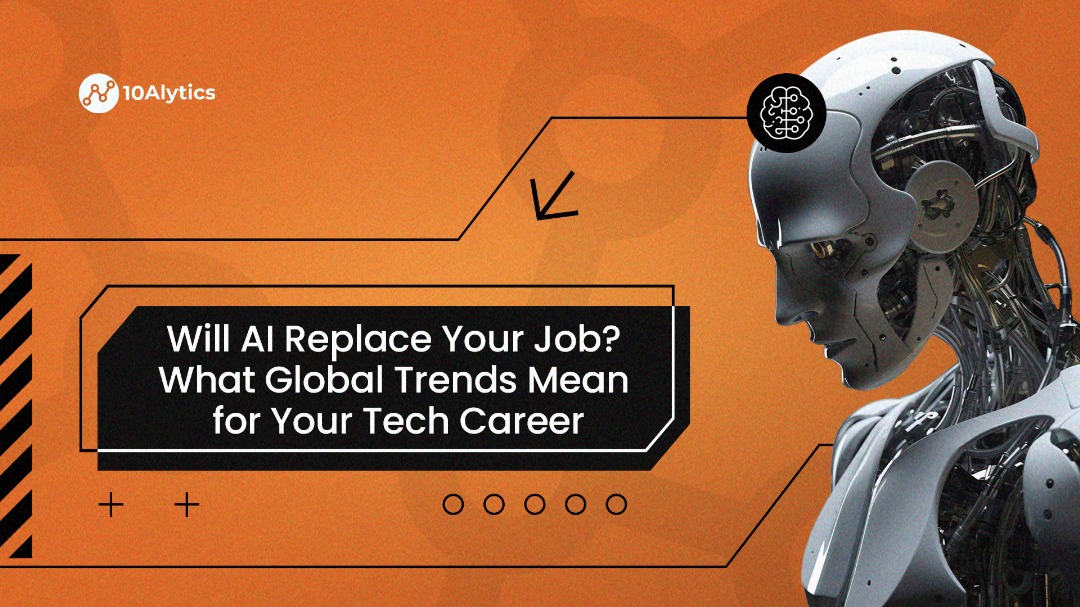
Will AI Replace Your Job? What Global Trends Mean for Your Tech Career
Artificial Intelligence (AI) is transforming industries at a scale we’ve never seen before. From ChatGPT writing reports in seconds to AI copilots helping developers code faster, technology is advancing at breakneck speed.
Naturally, one big question comes up: Will AI replace your job?
The truth is more nuanced. AI will disrupt millions of jobs, but it will also create new opportunities for those who are prepared. This article explores global trends, what they mean for your career in tech, and how you can adapt to thrive in the era of AI.
Will AI Replace Jobs? The Numbers Tell a Story
According to the World Economic Forum’s Future of Jobs Report 2023, AI and automation are set to disrupt 44% of workers’ skills in the next five years. By 2027, machines are projected to perform more tasks than humans in many industries.
But here’s the good news: while 83 million jobs may be lost, another 69 million jobs are expected to be created in areas like data, AI, and digital transformation.
World Economic Forum: Future of Jobs Report 2023
This shift highlights a crucial reality: AI won’t replace all jobs, but it will replace tasks, especially repetitive and predictable ones. The professionals who remain relevant will be those who adapt, upskill, and learn to work alongside AI.
Global Trends Reshaping Tech Careers
Let’s break down the five biggest global trends that will affect your tech career over the next decade:
1. Hybrid Human-AI Collaboration
AI is no longer just about automation; it’s about augmentation. In most industries, humans and AI will work together. For example:
- Developers using AI copilots (like GitHub Copilot) to speed up coding.
- Analysts relying on AI tools to crunch massive datasets in seconds.
- Designers using AI to generate creative prototypes quickly.
This means that instead of competing with AI, the real skill is learning to leverage AI tools to increase your productivity.
2. Upskilling and Reskilling Become Non-Negotiable
A McKinsey Global Institute study found that by 2030, 375 million workers worldwide may need to switch occupations due to automation.
The most in-demand skills won’t just be technical (like Python, SQL, or cloud computing). They’ll also include:
- Adaptability Quotient (AQ): the ability to pivot when industries evolve.
- Critical thinking & problem-solving.
- Digital literacy, using AI and cloud tools effectively.
Employers are already prioritizing workers who can learn quickly and adapt.
McKinsey: Jobs Lost, Jobs Gained Report
3. Global Competition and Remote Opportunities
AI-powered collaboration tools (Slack AI, Zoom AI, Microsoft Copilot) have made it possible for companies to hire the best talent globally.
For professionals, this means:
- More remote opportunities.
- More global competition.
To stand out, you’ll need globally recognized skills and certifications.
At 10Alytics, we prepare you for exactly this. Our programs are built for international career readiness in Data Analytics, Business Analysis, Agile Project Management, Cybersecurity, and more.
4. Ethics, Privacy, and AI Governance
AI isn’t perfect. From bias in algorithms to privacy concerns, organizations need experts who can manage these risks.
This opens up new career paths in:
- AI governance and policy.
- Ethical AI frameworks.
- Data privacy and compliance.
If you have an interest in technology and social impact, this is a powerful niche to explore.
5. AI as a Career Accelerator
Instead of fearing AI, see it as your productivity booster.
For example:
- Developers can write code 50% faster with AI tools.
- Marketers use AI to personalize campaigns at scale.
- Data professionals process millions of rows in minutes using AI analytics tools.
The professionals who succeed in the AI era won’t just know their craft, they’ll master the tools that make them 10x faster and smarter.
What This Means for Your Career in Tech
If you’re a student, graduate, or mid-career professional, here are three career strategies to keep in mind:
- Don’t compete with AI, collaborate with it.
Start using tools like ChatGPT, GitHub Copilot, or Tableau AI in your work. - Invest in future-proof skills.
Learn data analytics, cloud, and product management, skills driving global demand. - Think global, not local.
The job market is borderless. Certifications and hands-on projects matter more than your location.
How to Stay Ahead with 10Alytics
At 10Alytics, we help ambitious professionals future-proof their careers. Our programs are designed to give you hands-on experience, global exposure, and mentorship from industry experts in the US, UK, and Canada.
By joining our next cohort, you’ll:
- Learn in-demand skills like Data Analytics, Business Analysis, Agile Project Management, and Cybersecurity.
- Build real-world projects for your portfolio.
- Gain career support that connects you to global opportunities.
Want clarity on the best career path for you? Speak with a professional today HERE.
Key Takeaways
So, will AI replace your job? The answer is: it depends on how you respond.
- AI will automate repetitive work.
- New jobs will emerge in tech, AI, and governance.
- Professionals who upskill and adapt will thrive in the global economy.
The question is not if AI will reshape your career; it’s whether you’re preparing for it today.
References & Further Reading
- World Economic Forum – Future of Jobs Report 2023
- McKinsey – What the Future of Work Will Mean for Jobs
- Harvard Business Review – Reskilling in the Age of AI
- OECD – The Impact of AI on the Workforce
